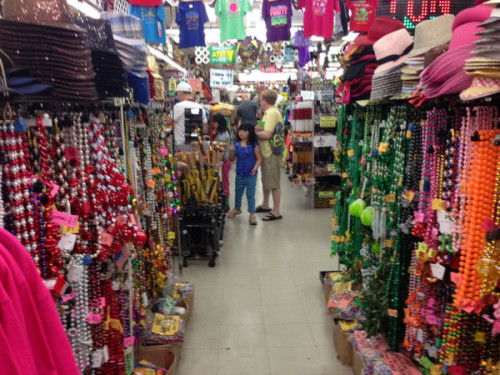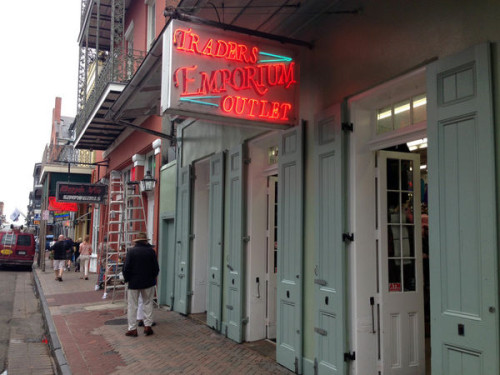Editor’s Note: As part of NolaVie’s Yeah you write! campaign, we are inviting readers to submit New Orleans-related content. Today’s commentary comes from William Khan, a second-generation New Orleans businessman whose family operates souvenir shops in the French Quarter. He earned a juris doctorate and Master of Business Administration from the University of Texas in Austin. He offers this viewpoint in light of a hearing for t-shirt shops to be held on Monday, May 12, at about 10:30-11 am in the City Council’s chambers before the Board of Zoning Adjustments. Under discussion is enforcement of a 2011 ban on new shops, as well as a pre-existing law that prohibits T-shirt shops from opening within 600 feet of another shop.

French Quarter souvenir shops: One owner argues they serve an important purpose.
When my mother and father decided to heed their American Dream 30 years ago, they moved their young family to New Orleans and risked everything to sell T-shirts, souvenirs, and everyday memorabilia in the French Quarter. They sought opportunity and the means to educate their children. Needless to say, the tourism economy of New Orleans 30 years ago afforded few opportunities for newcomers with a bustling family; the strip clubs, nudie bars, and adult establishments near my parents’ fledging shops in the French Quarter probably would not have offered any prospects for a former engineer and his family from South Asia.
For three decades, my family and our shops in the French Quarter have survived recessions, natural disasters, crime waves, and Hurricane Katrina. But we may not survive the current assault on retailers that happen to sell T-shirts, gifts, and souvenirs in the French Quarter and whose only crime may be selling what ordinary families want.
Sadly, some vocal residents in the French Quarter — represented by Vieux Carre Property Owners, Residents, and Associates — seek to impose their personal vision of the city and have lashed out at groups that incidentally offer souvenir items in their shops. Now city officials are suddenly dictating that some businesses in the French Quarter remove all souvenirs from their stores, penalizing these shopkeepers for the smallest of infractions, and threatening more punishment.
Tolerance and respect for all stakeholders in a community are guiding principles of our country and perhaps best epitomized — until recently — in New Orleans. Sharing the cultural capital of the French Quarter through commerce, creativity, and economic diversity is a proud tradition here. Whether or not the government has the right to tell people what they can buy and where they can buy it, the persecution of shops that sell T-shirts, souvenirs, and gifts is misguided and contrary to New Orleans’ inclusive heritage.
The T-shirt, souvenir, and gift shops of the French Quarter are not only part of the city’s fragile tax base. but they also offer personal pathways for various tourists and locals to remember their experiences, share their memories, discover unique and affordable items, promote the city, and tap into the rich cultural tapestry of New Orleans. Hats, masks, and souvenirs make strolls along the Quarter more colorful. The humorous gadgets sold by various stores add to the evening’s fun. Shopkeepers and their associates scrub the sidewalks after all of the parties in the morning; they welcome guests warmly and make sure those who wander into their stores to take a picture or find a gift know how to return home or to their hotel.

A souvenir shop in the French Quarter: balancing the booze joints.
Our businesses balance the beer joints, daiquiri outlets and nude bars with family-owned and family-friendly establishments. We offer gifts that can be shared at home to memorialize and promote the allure of New Orleans — tokens for family members and friends who could not make it — and we offer this service at reasonable prices. Our products and stores carry what ordinary customers and families want and are rooted in free enterprise. In 30 years, we have carried these items because they promote the city and help visitors better enjoy their experience.
The city’s ability to connect with tourists from a variety of backgrounds has always been based on an environment that is diverse and expressive, not authoritarian and joyless. If tourists, residents, and other stakeholders of the French Quarter eventually seek out higher-end retail, then the environment will evolve democratically and the market will achieve a natural balance. Many high-end retail art galleries, antique shops, and boutiques on Royal Street cater to wealthy tourists. Given the lack of scrutiny placed upon other businesses that arguably pose greater nuisances for their neighbors in the French Quarter, the current intimidation of souvenir shops violates the principles this country and the free marketplace is established on.
The Landrieu Administration and City Council hardly need a reminder about economic inequality, the equal importance of every demographic, and the dangers of making our local economy too insular or catering to the whims of a few. In the French Quarter, very few items can be sold at a profit in sufficient quantities; the residential population decreased from more than 4,100 in 2000 to roughly 3,800 in 2010. Locals have not shown a willingness to buy the quantities and pay the fees sufficient to cover formidable rents in the Quarter and other operating costs.
As the larger customer market for French Quarter merchants, visitors can transport only a limited number of items at a reasonable rate. Consequently, souvenirs, t-shirts, and small items derived from the famous sites, foods, and wildlife of the region primarily sell. Some of the past, present, and future events hosted by the city reflect this economic reality; by and large, Super Bowl fans (2013), Essence Festival enthusiasts (held every summer), and WrestleMania followers do not buy extravagant art or antiques. Ironically, T-shirt, souvenir, and gift shops tend to offer items that appeal to visitors and families from each of these eclectic events. If T-shirt and souvenir shops are displaced entirely, sellers that use mobile kiosks, go-carts, or folding tables are likely to sprout up to meet the natural demand for inexpensive clothes, gifts, and souvenirs. These temporary and roaming merchants will be difficult to monitor and regulate.
My family business prides itself on offering opportunities to immigrants, newcomers, and often overlooked and diverse segments of the community. We have team members from every continent and a wide variety of cultures, including Africa and Asia. Our shops are some of the first gateways for immigrants and newcomers to New Orleans to become part of the French Quarter economy and cultural community; many of these people go on to establish their own businesses, lead productive lives in New Orleans, and enrich the city (both in terms of culture and tax revenue). The diversity in the T-shirt and souvenir shops of the French Quarter also reflects the diversity of the U.S. in the 21st century in general.
Tourism, diversity, and neighborhood preservation are not natural adversaries. The most vibrant urban areas in America consist of neighborhoods that support mixed uses, density, and evolution based on market conditions — not cultural preferences or what individual groups deem respectable. A collaborative and inclusive approach to addressing the concerns of residents, businesses, and visitors is more fitting with the city’s tradition of tolerance than the attitude of intimidation and suppression currently shown toward area gift shops.
Not every T-shirt operator is engaging in the worst excesses that have understandably earned the ire of some residents in the French Quarter. Many of these businesses are independent family-owned and operated businesses that have survived economic turmoil, social upheaval, and natural disasters. They have provided consistent tax revenue, property maintenance, and employment to a variety of marginalized and immigrant groups, without placing too many demands on local resources or the environment. Dialogue among responsible merchants, city officials, and residents would better conserve scarce public resources and allow the police to focus on threats to safety and health. Collaboration between the city, residents, and businesses would also dispel concerns that the scrutiny placed on souvenir shops — but conspicuously not directed at other types of businesses — is rooted in bias or cultural prejudice.
 NOLAbeings Multimedia artist Claire Bangser created NOLAbeings as a portrait-based story project that marries...
NOLAbeings Multimedia artist Claire Bangser created NOLAbeings as a portrait-based story project that marries...  Voodoo in New Orleans: Reviving history: New Orleans fortune telling This article takes a deep dive into the history of Voodoo in New Orleans, its hybridization with Catholicism, and its present-day place in the city's culture. The author visits fortune-tellers in the French Quarter, using their guidance as a tool for introspection rather than a deterministic predictor of the future. Through her experiences in New Orleans, the author feels a mystical connection to both the past and the future.
Voodoo in New Orleans: Reviving history: New Orleans fortune telling This article takes a deep dive into the history of Voodoo in New Orleans, its hybridization with Catholicism, and its present-day place in the city's culture. The author visits fortune-tellers in the French Quarter, using their guidance as a tool for introspection rather than a deterministic predictor of the future. Through her experiences in New Orleans, the author feels a mystical connection to both the past and the future. 